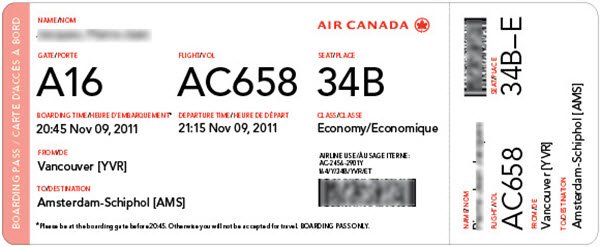Most people treat the boarding passes for flights as a piece of trash after they’re through with the concerned journey. Some may file it somewhere for future reference, but in most cases, the boarding passes end up in the trash can. Not shredded, though. There is plenty of information on the boarding pass that others with malicious intent can use for their own benefit. Let’s see what all it contains and why you should not simply throw it away without shredding or tearing it properly.

Information on Boarding Pass Barcode
Almost all airlines have now switched to boarding passes containing a barcode. A barcode looks like a sequence of straight lines – thick and thin. QR codes look like a square spilled with ink. Though they look innocent, they contain a good amount of information that others may use for their gain.
Besides the readable stuff, a boarding pass accommodates passenger’s last name and also the record key for the flight he or she is taking. Flier miles are also present on most of the reputed Airlines’ bars or QR codes. Using this data on the website of the airline, people can get much more information, such as details about flights booked for the future, flier miles, and other data that might identify a person.
With that information, anyone can change future flight seats, cancel the flights altogether and even reset the airline account so that the original passenger is no longer able to access his account right away.
There are websites like this or this one (use at own risk) that can read many types of Barcodes – 1D, 2D, QR, and other types so you don’t have to download any Barcoder reader or scanner software for the purpose. You just have to take an image of the boarding pass and run it through the barcode readers or through the linked websites above. They will provide you with all the information printed in the barcode.
In short, the information on the boarding pass contains the following:
- Name of the passenger
- Phone number of the passenger
- The email address of the passenger
- Frequent flier number of passenger
- Information about all future flights reserved by the passenger from that account
- Linked access to email accounts
- Linked access to card details or financial accounts
- Ability to perform social engineering with the information available
Thus, if a criminal wants, she or he can collect the data, use social engineering or phishing to get more data, and use all of it for a fraud.
How to protect your Boarding Pass data
If you have been throwing away your boarding passes, you may want to check your credit card and bank statements, etc., to detect any fraud. It is a healthy practice to look at the statements even if you don’t regularly fly, as it helps you check irregularities, if any.
Other than that, there are not many reasons to worry. Just make sure that you don’t simply crumple and throw away your boarding passes. Either file them somewhere safe or shred them (or tear them in a way that the barcode is unreadable).
There is a good amount of information on the boarding pass. But you need not panic if you can make sure that nobody else can get their hands on the pass slip with the barcode intact.
Remember – Shred the Boarding pass before you throw it away in the trash can!
Now read about Credit Card Skimming and Pin Theft Frauds and how to stay safe.